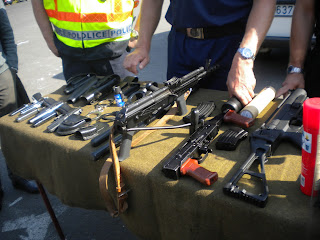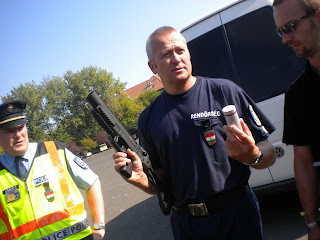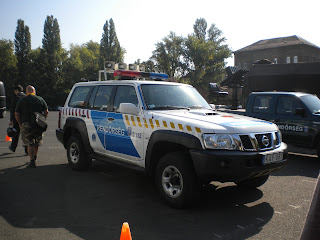This past wednesday, all us JSBPers headed off to the Riot Police station located in Budapest. Unsure exactly of the role of these men, I was intrigued to find out exactly what made them different from just being called the local police. Plus I was secretly hoping to see some SWAT Team action or something cool like that. The presentation of this talk was very different from what we have seen so far because the lady spoke Hungarian and Ildiko had to translate everything for us. This made it somewhat difficult to ask questions as they arose and to really understand what she was saying. However, we quickly learned that Riot Police are the 2nd largest unit of enforcement after the local police, and unlike the local police they can work anywhere in the country as opposed to having jurisdiction in only one district. The local police, anywhere in HU, can invite the riot police to come work on a case if they need more personnel. There are several other offices all over the country, but the main headquarters is this one here in Budapest. Riot police rank somewhere in the middle of the entirety of law enforcement in the whole country. There are 14 departments with 160-200 people in each one. That makes for 3459 total riot police officers. I don't see how any riot is getting out of control with that many! One of the main jobs of the riot police is to- control riots! Surprise! Any big events: sports games, riots, holiday festivals, concerts- it is their job to keep in control. The riot police offer a special services department which covers things like a bomb control unit and a cash transport service among other things. They also have a tactical team who is made up of high skilled, trained officers that get sent to go after the most dangerous criminals. (That would clearly be my job- chasing bad people). There is a strong relationship between the border police and the riot police because of the amount of immigrants trying to come into Hungary, and then make it further west. The immigration unit and public security work together on this to monitor fields, rivers, and even trains. Officers ride the passenger cars to make sure no one has snuck on. I was interested to learn that all people go through training for 1 year and then they come over to the riot police station where they are on their "probation" period. They live in barracks on the property and follow around the prominent officers on the streets and learn through observing. Although they are not allowed to act on much on their own during this period, while standing next to an officer they can give orders or ask to check for IDs. This is how they train. To me, this is THE MOST effective way of training. When you throw someone right into the field after one year of schooling, they are going to learn best because they have had an introduction and learned a lot from the student perspective, but without anything hands on it is hard to get a feel for what the job entails. As soon as you throw them right into the work, they must learn quickly and certainly become more confident in their role as a training officer. It takes 2 years to become an officer, then they can apply to a unit they would like to go to. A university degree is necessary for any high ranking positions within the force so some people continue on with 2 years of schooling after that, or it is possible to attend the police university from the start, for a total of 4 years. Although the talk was extremely stimulating, the action we got to see after was SO COOL. We managed to be there on a good day, when officers from other countries were visiting too. That meant they had set up all the trucks and tanks, all the guns, showed us the equipment they wear and even let me sit on the back of a truck with a lot of guns and pretend to shoot them! They were tear gas guns and looked SO AWESOME. I sat right up there in my pink sweater and flip flops and pretended I was cool and official. I was also volunteered by one of the officers to run and help them show how to catch a fleeing person with a net. Not sure how I feel about that. The coolest part of everything though, was getting to watch action performance examples of the officers all covered in their decked out equipped uniforms. They did role playing to show us how they would fight back and control a riot in many different situations. It was AWESOME. We also got to watch an attempted arrest and how to go about it. The officer even took the car home after he arrested the guy! Although I am most interested in the FBI acting as a special agent, something like this real interests me. I could see a lot more action and do a lot more than a local police officer I feel, and be able to get this special training. All in all, it was an EXTREMELY fascinating experience and of course for me, interested in law enforcement beyond the local level, I thought this was a pretty cool chance to once again, explore a job that might appeal to me.
 |
| Barracks where the students stay when on their "probation" period! |
 |
| This is what the officers wear when going in to control a riot. |
 |
| All the guns- modeled after the original AK 47. These are mostly tear gas guns. |
 |
| Last time I checked, that is a very bad way to hold a gun. |
 |
| This is the shield that the officers use. It deflects almost anything that hits it and it very heavy. |
 |
| I hope to not be riding in one of these while I am here. |
 |
| DANGEROUS. |







Hey Nellie,
ReplyDeleteNice post, I love the fact that I can really hear your voice through your writing. It's interesting that you mentioned the fact that Hungarian police officer's need to go through at least a year of field training after their schooling before they can officially yield any power. I completely agree that this was a crucial aspect of what we learned at the riot police station. You definitely need to get some real world training with experienced police officer's before you can truly know what you're doing. I also liked your description of the various riot police equipment that we got to see. That stuff really was pretty sweet,
Nice pic at the end too.
Keep firing,
Tito